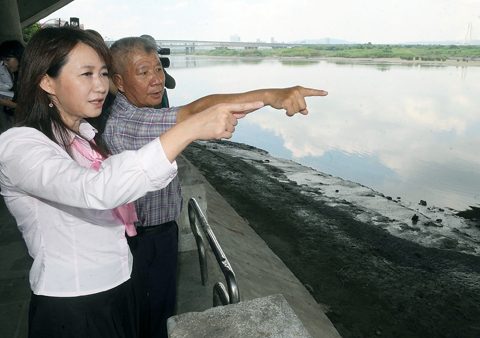Democratic Progressive Party (DPP) Taipei City councilors yesterday challenged Taipei Mayor Hau Lung-bin’s (郝龍斌) Tamsui River (淡水河) clean-up record, alleging he has taken credit for the work of others.
Leading the press to inspect the river yesterday morning, DPP Taipei City councilors Chien Yu-yen (簡余晏), Lee Ching-feng (李慶鋒) and independent Councilor Chen Chien-ming (陳建銘) played Hau’s latest campaign video and criticized him for misleading the public into believing that he was the one who cleaned up the Tamsui River.
In the video, Hau, who is seeking re-election, pledged to build Taipei into a beautiful city, surpassing Seoul and Tokyo. Hau also pledged to make the Tamsui River basin into a second Manhattan.

PHOTO: WANG MIN-WEI, TAIPEI TIMES
Calling Hau’s ability to deliver into question, Chien pointed at the filthy and smelly river behind her that runs through the capital city and Taipei County.
She also said Hau’s video had footage of the Fisherman’s Wharf and Tamsui MRT station, both of which are located in Taipei County. She dared him to replace the footage with clips from the river near the city’s Dadaocheng (大稻埕) area and Zhongxiao Bridge (忠孝橋), which she said was highly contaminated.
Chien said the Tamsui River has been polluted and smelly for the past four years. Now as Hau is up for re-election, he has brought up the subject once again and declared that he has done a good job cleaning up the river, but used other sections of the river in his promotion video.
“I have no idea whether he is the mayor of Taipei City or commissioner of Taipei County,” she said.
She said Fisherman’s Wharf was the accomplishment of Hau’s election opponent, former Taipei County commissioner Su Tseng-chang (蘇貞昌) of the DPP. She added the Tamsui MRT station was planned and built when former president Chen Shui-bian (陳水扁) was Taipei mayor.
Lee said the water quality near the Zhongxiao Bridge and Chongyang Bridge (重陽橋) has always been the worst.
Chen said the city spent NT$21.6 billion (US$676,861 million) over the past four years dredging the Tamsui River, but the result was not impressive. The sections near Dadaocheng and Dachia (大佳) were so contaminated and silted that the Blue Highway ferry system (藍色公路) was but an empty shell, he said.
The ferry system was built after the railroad connecting Tamshui to Taipei Main Station was dismantled to make way for the MRT’s Tanshui Line. The system did not succeed and in 2000, the route was revitalized as a tourist attraction.
The main trunk of the river cruise runs from its northernmost point at Fisherman’s Wharf in Danshui to its southernmost point at Dadaocheng Wharf.

The first global hotel Keys Selection by the Michelin Guide includes four hotels in Taiwan, Michelin announced yesterday. All four received the “Michelin One Key,” indicating guests are to experience a “very special stay” at any of the locations as the establishments are “a true gem with personality. Service always goes the extra mile, and the hotel provides much more than others in its price range.” Of the four hotels, three are located in Taipei and one in Taichung. In Taipei, the One Key accolades were awarded to the Capella Taipei, Kimpton Da An Taipei and Mandarin Oriental Taipei. Capella Taipei was described by

EVA Airways today confirmed the death of a flight attendant on Saturday upon their return to Taiwan and said an internal investigation has been launched, as criticism mounted over a social media post accusing the airline of failing to offer sufficient employee protections. According to the post, the flight attendant complained of feeling sick on board a flight, but was unable to take sick leave or access medical care. The crew member allegedly did not receive assistance from the chief purser, who failed to heed their requests for medical attention or call an ambulance once the flight landed, the post said. As sick

Minister of Economic Affairs Kung Ming-hsin (龔明鑫) yesterday said that private-sector refiners are willing to stop buying Russian naphtha should the EU ask them to, after a group of non-governmental organizations, including the Centre for Research on Energy and Clean Air (CREA), criticized the nation’s continued business with the country. While Taiwan joined the US and its Western allies in putting broad sanctions on Russia after it invaded Ukraine in 2022, it did not explicitly ban imports of naphtha, a major hard-currency earner for Russia. While state-owned firms stopped importing Russian oil in 2023, there is no restriction on private companies to

INDUSTRY: Beijing’s latest export measures go beyond targeting the US and would likely affect any country that uses Chinese rare earths or related tech, an academic said Taiwanese industries could face significant disruption from China’s newly tightened export controls on rare earth elements, as much of Taiwan’s supply indirectly depends on Chinese materials processed in Japan, a local expert said yesterday. Kristy Hsu (徐遵慈), director of the Taiwan ASEAN Studies Center at the Chung-Hua Institution for Economic Research, said that China’s latest export measures go far beyond targeting the US and would likely affect any country that uses Chinese rare earths or related technologies. With Japan and Southeast Asian countries among those expected to be hit, Taiwan could feel the impact through its reliance on Japanese-made semi-finished products and